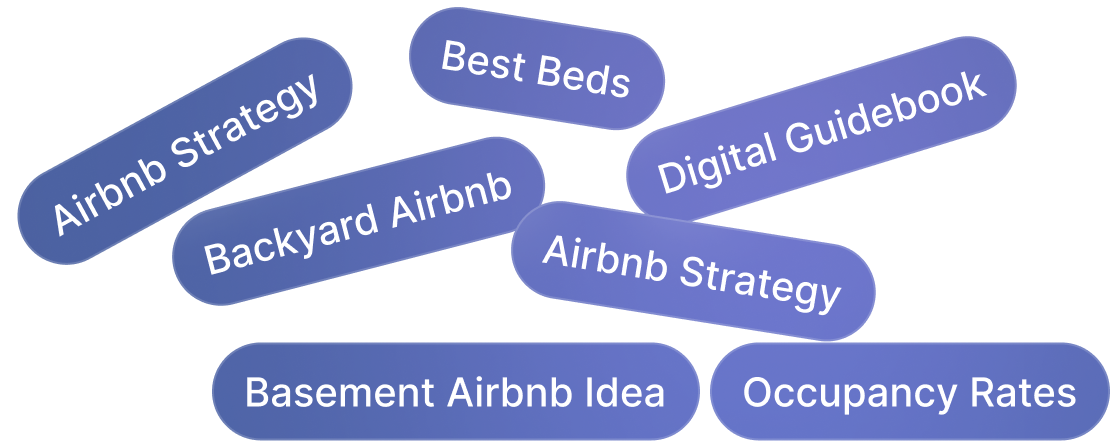Online travel agencies (OTAs) have impacted the way short-term rental hosts connect with travelers. By providing a platform to list and manage properties, OTA travel services offer hosts an opportunity to reach a global audience and increase their nightly bookings.
For hosts, navigating this competitive marketplace requires a blend of strategic pricing, compelling property listings, and exceptional guest experiences. Understanding how to leverage OTAs well is a must for success in this industry. This guide explores the relationship between OTA travel and short-term rental hosts, including benefits, strategies, and potential challenges.
Host Tools provides an automated, unified calendar for short-term rental hosts, allowing you to seamlessly list on all major channels. Start your free trial today!
What Is an Online Travel Agency?

An online travel agency is a digital platform where travelers can plan and book their trips. OTAs act as intermediaries, offering the ability for users to compare prices on hotel rooms, short-term rentals, car rentals, flights, and more from various providers.
Regarding short-term rental hosts, OTAs serve as a bridge to potential guests. They offer a centralized marketplace where properties are showcased to millions of travelers. These platforms streamline the booking process, allowing travelers to browse available options, compare amenities, and confidently secure accommodations — all with just a few clicks.
How OTAs Simplify the Guest-Host Connection
For short-term rental hosts, OTAs are more than a listing site. They handle everything from marketing to payment processing. This allows you to focus on providing an exceptional guest experience. Popular OTAs such as Airbnb, Booking.com, and Vrbo allow hosts to:
- Reach a global audience of travelers.
- Manage availability calendars, pricing, and reservations through a single interface.
- Offer guests a secure and simple booking process
Benefits of Using an Online Travel Agency for Short-Term Rental Hosts
Why use them? Let’s take a look:
1. Increased visibility and access to a wider audience
OTAs have massive online reach. The different types of OTA platforms, like Airbnb and Booking.com, attract millions of monthly visitors globally. These users are looking specifically for unique stays, boutique and luxury properties, hotel bookings, or vacation options. Listing your property on an OTA instantly exposes you to a broader audience than you could reach through personal websites or local advertisements.
2. Simplified management of listings and reservations
Managing bookings can be overwhelming, especially if you’re using multiple platforms. OTAs simplify this process with centralized tools. Features such as synced calendars, instant booking options, and automated communication help you avoid double bookings and reduce time spent on admin tasks.
3. Tools for pricing optimization and competitive analysis
Pricing a short-term rental competitively requires more than guesswork. This is where OTAs shine. Many platforms offer dynamic pricing tools that adjust your rates based on market demand, local competition, and seasonal factors. You can also access competitive insights, helping you tailor your pricing strategy to remain attractive to potential guests without undervaluing your property.
4. Improved guest experience and trust
Reputation is everything in hospitality. OTAs help nurture guest trust by providing secure payment methods, detailed property descriptions, and verified reviews. When guests book through reliable platforms, they feel more confident about their stay.
Additionally, OTAs often have dedicated support teams to assist travelers, reducing any friction that might arise during the booking process. With features like multi-language support and travel protection, OTAs ensure your property appeals to a diverse group of guests while offering them peace of mind.
Best Practices for Maximizing OTA
To fully capitalize on the opportunities OTAs present, it’s important to approach these platforms strategically. Here’s how:
1. Choose the right OTA for your property
Not all online travel agents are created equal, and each caters to a distinct audience. Platforms like Airbnb specialize in unique, experience-driven stays, while Booking.com caters more broadly to travelers seeking independent hotels or quick getaway options. To identify the right platform:
- Understand your target audience and what they value most in accommodations.
- Research which OTA aligns with your property type and location.
- Evaluate commission rates and platform-specific features.
For example, if you’re looking to target families, Vrbo—known for spacious vacation rentals—might be your best bet. That said, we always suggest adopting a multi-channel distribution strategy.
2. Optimize your listing
Your listing is your first impression. Here’s how to make it count:
- Use high-quality, well-lit photos that showcase your property.
- Write a detailed yet concise description highlighting unique features and amenities.
- Include accurate information about pricing, availability, and house rules.
- Respond to inquiries promptly and maintain a welcoming tone in your communication.
Utilizing these steps will also improve your ranking within the platform’s search results.
3. Balance OTA use with direct booking channels
While OTAs are powerful tools, rely on them strategically to avoid becoming overly dependent. Use OTAs to attract new guests, then encourage repeat visitors to book directly through your own website:
- Provide incentives like discounts or freebies to drive direct bookings.
- Include your website and contact information on in-property materials.
- Build loyalty programs to keep guests returning.
Driving direct bookings allows you to save on OTA commission fees while strengthening your relationship with guests.
How OTAs Shape the Future of Short-Term Rentals
With innovations in technology and shifts in consumer behavior, OTAs continue to play an evolving role in the travel industry. Emerging trends like virtual reality tours, AI-powered recommendations, and integrated guest reviews will further improve the guest experience.
For short-term rental hosts, staying ahead of these trends means integrating OTAs into your overarching business strategy. By understanding how these platforms work and how to optimize their use, you can build a sustainable, profitable rental business while still delighting your guests.
How Host Tools Can Help
Host Tools is a powerful platform designed to simplify and automate tasks for short-term rental hosts. With its comprehensive suite of tools, Host Tools helps streamline operations by integrating with popular OTAs, such as Airbnb and Vrbo, ensuring seamless synchronization of calendars and preventing double bookings.
Additionally, the platform offers automated messaging features, allowing hosts to maintain excellent communication with guests without the need for constant manual effort. Hosts can also leverage features like dynamic pricing, scheduled cleaning notifications, and smart locks integration to enhance operational efficiency and guest satisfaction. By using Host Tools, rental hosts can save time, reduce stress, and focus on creating exceptional experiences for their guests while maximizing their profits.
Final Thoughts
As the short-term rental industry continues to grow and evolve, it is essential for hosts to stay updated on emerging trends and technologies. By embracing new tools and strategies, hosts can enhance their business operations and provide an exceptional experience for their guests.
Implementing Host Tools as part of your overall strategy can help you stay ahead in a competitive market while ensuring a seamless and enjoyable experience for both you and your guests. So why wait? Sign up for a 14-day free trial with Host Tools and take your short-term rental business to the next level!
Host Tools provides an automated, unified calendar for short-term rental hosts, allowing you to seamlessly list on all major channels. Start your free trial today!


